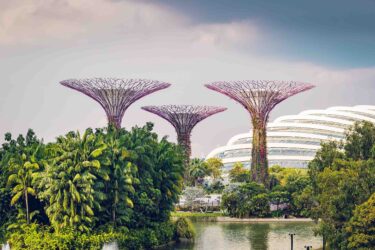Share this article
A surge in sustainability jobs shows Singapore trending towards a low carbon economy
The market for sustainability and climate action in Singapore has expanded significantly in recent years. Key national policy drivers are varied but at present include:
- The Singapore $5 carbon tax, which is anticipated to increase in the coming years
- A Long-Term Low Emissions Development Strategy with targets of halving emissions from a peak in 2030 to 30 MtCO2-e by 2050 and net zero emissions as soon as viable in the second half of the century
- The Singapore Green Plan 2030 adopted in early 2021. The SG Green Plan sets out targets such as planting one million more trees, 20% of schools to become carbon neutral by 2030, encouraging sustainable fuels, increasing public transport as a mode of transport by 75% and targets to reduce waste.
While the 2018 Sustainable Cities Index ranked Singapore as the most sustainable city in Asia, the global Climate Action Tracker has assessed Singapore’s climate ambition with respect to the Paris Agreement as highly insufficient. Corporate action for sustainability is seeing increasing momentum as businesses take the lead on developing sustainability strategies, setting net zero emissions targets, measuring and reducing their carbon footprints and implementing various sustainability initiatives and programmes.
A key indicator of this trend has been the surge in sustainability job advertisements among Singaporean companies over the past year, a clear sign that businesses are seeking to transition to a more sustainable and low-carbon economy.
Here we provide an analysis of the skills in demand demonstrating Singapore’s shift towards sustainability, explore the government’s Enterprise Sustainability Programme and discuss what companies can do if they can’t source the right talent.

Singapore sustainability skills in high demand
Our analysis of Singaporean sustainability jobs advertised identified four main areas of specialist sustainability skills.
Sustainability and ESG strategy
By far the largest demand for sustainability-related skills and job descriptions has been for developing and implementing internal sustainability strategies, in both SMEs and large entities. These are often framed through the lens of Environmental, Social and Governance (ESG) considerations. Companies are seeking skilled applicants to address their needs at four different stages of implementing a sustainability journey
- Sustainability trends and requirements
- Sustainability strategy development
- Sustainability Implementation methodology and metrics
- Sustainability Implementation and reporting
Stakeholder engagement and communication
There is naturally a strong emphasis on engaging with internal and external stakeholders, and communicating the companies’ sustainability approach, ambitions, and performance. Companies are looking for support with engaging stakeholders across their supply chains to implement sustainability strategies and to gain a deeper understanding of their supply chains’ practices, metrics and certifications.
Emissions reductions and roadmap to net zero
In line with an increasing number of Singaporean companies announcing net zero emissions targets, companies are looking to upskill their teams to drive internal emission reduction targets.
Decarbonisation roadmaps and targets around renewable energy and recycling are key, as are developing emissions reduction and net zero strategies in line with global best practices such as the Greenhouse Gas Protocol.
Sustainability education and communication
As sustainable development increasingly comes to the forefront of Singaporean companies’ priorities, their employees need to understand what this means for them and how it impacts them. To ensure internal goals are understood and targets are met, awareness and education programs are important. Companies are now seeking professionals to develop and implement sustainability awareness and training and education programmes for their staff as well as across their supply chains.
Singapore Government support towards sustainability – the Enterprise Sustainability Programme
In recognition of the growing momentum and need for sustainability transformations in local businesses and the level of skills needed to accommodate this shift, Enterprise Singapore is launching the Enterprise Sustainability Programme (ESP) later in the year. The ESP will support local businesses in developing capabilities and capitalising on opportunities to transition to a low-carbon economy through three key focus areas:
- Developing sustainable enterprises
- Supporting development of products, services and solutions for the green economy
- Strengthening sustainability business ecosystem
This will provide a real benefit for companies looking to transition to more sustainable business practices as it includes opportunities for funding to develop sustainability strategies and optimise resources.
The case for external technical support
It’s clear there is an increasing need in the Singapore labour market for talent with strong sustainability skills, but with such high demand, how can companies move forward if they can’t source the right fit and how can external support complement their own in-house skills?
Transformations of this nature are often more successful when internal capability building and external expert advisory support are combined.
Expanding team capabilities to develop and implement sustainability initiatives internally enables companies to build in-house skills. This can be complemented with the guidance of external technical experts, who are fully immersed in the specific areas where companies need the greatest support. With history and expertise in similar projects across sectors, external support can bring a deeper understanding of the opportunities and potential challenges, an understanding of market dynamics, an objectivity that complements internal priorities, and the ability to tailor industry best practice approaches to companies’ needs.
Outlook for the sustainability market in Singapore
There is no doubt that the business and regulatory environment in Singapore is shifting towards a low-carbon future. Now more than ever there is a need for specialist skills either in-house or third-party experts, to enable organisations to embrace sustainable transformations. A consolidated effort will be required across sectors, supply chains and individual business functions to integrate sustainability within the core of organisations. If you’re a business that needs assistance or guidance with your sustainability strategy we have experts who can help.

